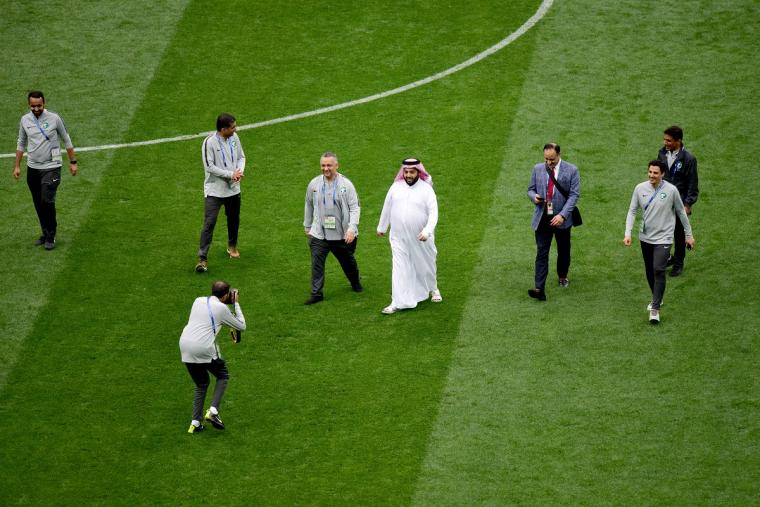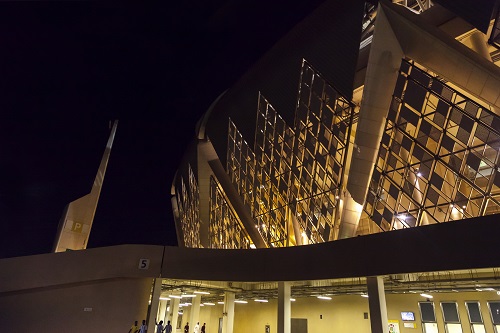
As the 2022 FIFA World Cup in Qatar approaches — the first matches will be played in less than three months — another Middle Eastern country is kicking around the idea of hosting a major international sporting event.
Inside the Games reports that Prince Abdulaziz bin Turki Al-Faisal Al Saud, Saudi Arabia’s sports minister and the Saudi Olympic and Paralympic Committee president, recently told Agence France-Press that “the Olympics would be an ultimate goal for us,” adding that “we’re open to that and I think we can.”
“Investment in sports is a significant part of Saudi Arabia’s Vision 2030 strategy to diversify its economy away from oil, leading to the country staging numerous sporting events and expanding the state-controlled Public Investment Fund’s (PIF) portfolio overseas,” notes Inside the Games.
Saudi Arabia will host the 2034 Asian Games for the first time. The host city, Riyadh, also will welcome the 2023 World Combat Games and the 2025 Asian Indoor and Martial Arts Games. Securing hosting duties for those events apparently has emboldened the country’s leaders, as Saudi Arabia also has bid to host the 2026 Women’s Asian Cup, the 2027 Asian Cup and the 2029 Winter Olympics, according to Inside the Games, which added that the FIFA World Cup also is on the country’s wish list — perhaps via a joint bid with Egypt.
Additionally, Public Investment Fund is financing the new LIV Golf tour and owns a controlling stake in the Premier League’s Newcastle United, plus the country hosted its first Formula 1 Grand Prix in 2021.
All of this sports-related activity has led to speculation that Crown Prince Mohammed bin Salman Al Saud is “sportswashing” by using sport as a vehicle to distract people from Saudi Arabia’s human rights record.
 Inside the Games ran down a litany of atrocities:
Inside the Games ran down a litany of atrocities:
The alleged state-ordered assassination of journalist Jamal Khashoggi, Saudi Arabia’s role in the bombings in Yemen, harsh restrictions on women’s rights and freedom of speech, and its use of the death penalty are among the examples of human rights abuses. Homosexuality is also illegal in the country.
Human rights activist Salma al Shehab, who is also a doctoral student in Britain, has recently been sentenced to 34 years in prison in Saudi Arabia over tweets calling for reforms and the release of prominent activists, clerics and other intellectuals in the country.
Still, Prince Abdulaziz has insisted change is happening within his country. “We’re progressing, we’re moving towards a better society, we’re moving towards a better quality of life, a better country, for the future,” he said, as reported by SportsPro Media. “And the facts show that hosting these events benefit[s] our people and benefit[s] these changes that are happening and benefits living in Saudi.”
Other distractions could come into play if Saudi Arabia were to host the Summer Olympics, namely the dry heat that forced World Cup organizers to move this year’s event to later in the year when temperatures in Qatar are expected to be cooler than when the World Cup traditionally is played.
Meanwhile, the list of countries officially announcing interest in hosting the 2036 Olympic Games keeps getting longer, with Mexico the latest country to explore a bid. Other countries include Germany, Great Britain, Hungary, India, Indonesia, Qatar, Russia, Spain and Turkey.
At the same time, though, hosting major international sporting events simply could become too risky. The recently completed 2022 World Games left host city Birmingham, Ala., with more than $15.5 million of debt — much of it impacting local businesses. World Games organizers cited several factors for the financial debacle, including fewer-than-expected international travelers attending the Games because of COVID spikes, a one-year delay of the Games (again because of the pandemic) and the withdrawal of two major sponsors two weeks prior to the Opening Ceremony.
“In the World Games, we see a case study, and a microcosm, of why cities are backing away from hosting large international multi-sport events. They are expensive, time-consuming, use innumerable resources — and in almost no cases do they live up to the promises of their organizers,” Sports Destination Management reported in August, citing issues related to the World Beach Games, the World Urban Games, the World Combat Games and the Olympics.
As proof, look no further than the 2030 Winter Olympics. Only three cities remain in the running to host after Spain withdrew in June. According to NBC Sports, the local governments of Barcelona and the Pyrenees region, which were to share hosting duties, were divided by internal politics.
“We had other brilliant candidacies [for the 2016 and 2020 Summer Olympics] that didn’t go ahead because we were competing with very strong rival cities,” Spain Olympic Committee President Alejandro Blanco said, according to Reuters. “But this one we have destroyed ourselves at our own home. There was no other way out than withdrawing our bid. We cannot spend months and months and months with the differences that there were. We were transforming an integrating project into a war between constitutionalists and independentists, [and] the Olympic spirit is not about that.”
The three contenders left standing are Sapporo, Japan; Vancouver, Canada; and Salt Lake City, Utah — all of which have hosted previous Winter Olympics. The winning bid is expected to be announced at the 2023 International Olympic Committee’s session in Mumbai, India.

